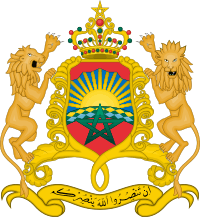Nouzha Skalli
Nouzha Skalli (born May 25, 1950 in El Jadida, Morocco) is a Moroccan politician from the Party of Progress and Socialism who served as Minister of Solidarity, Women, Family, and Social Development from October 2007 until January 2012 in the government of Abbas El Fassi.[1][2] She received her degree in pharmacy from the University of Montpellier.
Political career
- In 2002, she was elected MP at the house of Representatives for the PPS (Party for progress and socialism)
- In 2003-2004, she became chairwoman of the Socialist Alliance parliamentary group
- Vice chairwoman of the commission for social sectors at the House of representatives
- Member of the political bureau of the Party for progress and socialism
- Founding member and one of the national representatives of the democratic association of women of Morocco (ADFM), created in 1985
- Founding member and animator of the CLEF (Center for Feminine Leadership), created in 1997 in Casablanca
- Founding member of the Moroccan organisation of human rights (OMDH)
- Founding member of the Center for legal advice and support to assaulted women, created in 1995 in Casablanca
- Member of the administrative board of the National institution for solidarity to battered women (INSAF)
- Founder of the National committee for the political participation of women in 1992, Casablanca
- Former chairwoman of the national union of pharmaceutical workers unions of Morocco (1993–1997)
- Member of the Global Network for Local Governance's steering committee (GNLG), based in New Delhi
Awards
- By Espode: Feminine talents (March 2005)
- By Washington's Population Institute: Best leader award, December 2004
- By the Democratic association of Women of Morocco on Casablanca, 2002
- By the Parpaceutical union in 2001
- In November 2009 the Club de la Donne (wives club) awarded her the "Minerva" Anna Mammolitti prize, politics section
Publications
Nouzha Skalli wrote several articles and interviews in national and foreign newspapers:
ADFM publications
- Women's Rights in Morocco: The Universal and Specific (1992);
- Women and Power in Morocco: Mutilated Democracy (2001);
- Participative Budget (2003)
gollark: This isn't strictly an exact port, because the Haskell version uses floats and for efficiency this doesn't, but who cares.
gollark: It works! Although it's a bit dim for some reason.
gollark: Executing, wow this is slow I guess the `println`s slow it down a lot.
gollark: Let's see.
gollark: Huh. I might have solved it. There was a slightly different range on a loop.
References
- Imad Estito (23 January 2012). "Female Minister in Morocco's New Government: One Too Many?". Al Akhbar. Archived from the original on 18 October 2016. Retrieved 21 November 2013.
- "Ministère de la solidarité de la femme de la famille et du développement social au Maroc | Ministre Mme Bassima Hakkaoui | Projet : Association, Sociale, Femmes, Handicap". Social.gov.ma. Archived from the original on 2015-10-19. Retrieved 2013-08-11.
Further reading
- Eve Sandberg; Kenza Aqertit (2014). Moroccan Women, Activists, and Gender Politics: An Institutional Analysis. Lexington Books. pp. 54–59. ISBN 978-0-7391-8210-9.
This article is issued from Wikipedia. The text is licensed under Creative Commons - Attribution - Sharealike. Additional terms may apply for the media files.
